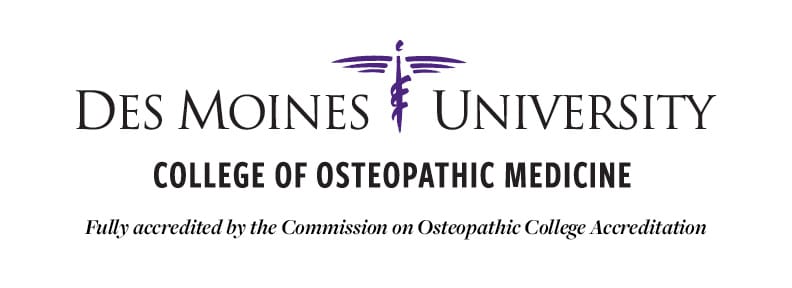
Nearly two years ago, DMU’s College of Osteopathic Medicine (COM) launched a process that closely coincided with the onset of the COVID-19 pandemic – the heavy lifting of again applying for and earning accreditation by the Commission on Osteopathic College Accreditation (COCA). The commission is recognized by the U.S. Department of Education as the accrediting body for colleges of osteopathic medicine; accreditation signifies that a college has met or exceeded its standards for educational quality.
In January, COM Dean Steven Halm, D.O., FAAP, FACP, received the good news that COCA had awarded the college full accreditation for a seven-year period.
“This verifies that we are a high-quality education program and that we are continually involved in improving the quality of our curriculum, our faculty, our facilities and our service to student success,” Dean Halm says. “DMU COM has always maintained full accreditation. Not all medical schools are able to do this.”
While the accreditation process officially began with a self-study, a comprehensive deep-dive into all components and processes of the osteopathic program, it’s actually an ongoing exercise for both the college and the University.
“Regular interaction with COCA does continue over the next seven years. We submit annual enrollment and mid-cycle accreditation reports to the commission,” says Kimberly Brown, Ph.D., M.Ed., DMU’s vice president and chief academic officer for academic and student affairs. “Accreditation is a continual process of evaluation, internally and externally, to ensure we’re providing the very best education to our students.”
It’s an effort that “takes a village,” says Amy Morris, Ph.D., assistant vice president for institutional effectiveness in academic and student affairs. The dean’s office and COM faculty who served as members of the COCA self-study standards team were key leaders, but the process also involved departments campus-wide, such as admissions, financial aid, the Student Counseling Center and the Center for Educational Enhancement (CEE).
Dean Halm calls the self-study process an opportunity to “take a deep look within our program and recognize areas of strength and areas for improvement.” COM worked to thoroughly document evidence that it meets COCA’s 12 accreditation standards in areas ranging from mission, finances and the learning environment to curriculum, scholarly activity and student outcomes.
The process culminates with a site visit by COCA evaluators, although that occurred virtually this time because of the pandemic. The evaluators conducted a number of interviews via Zoom, including opportunities for students and faculty to share their perspectives.
While receiving full accreditation is cause for celebration, Dean Halm and his colleagues aren’t resting on any laurels. Through the accreditation process, COM assessed and honed its program improvement plan and strategic planning process, efforts that will continue through the next accreditation cycle.
“The college’s department chairs and program directors tend to be involved in our overall quality improvement processes. These same leaders were involved specifically in our COCA self-study process,” Dean Halm says. “My intent is to bring together our college’s program improvement plan, strategic plan and COCA accreditation needs to this single group of leaders to avoid extra and redundant work. By intentionally integrating this into our existing, ongoing quality improvement and program improvement process, we will be very well prepared for the next accreditation site visit.”

